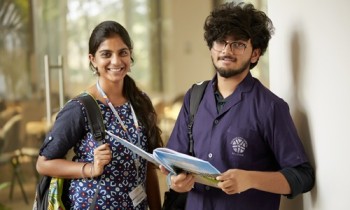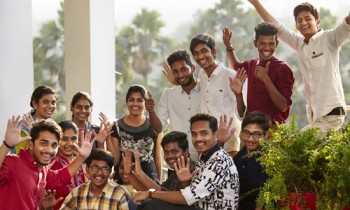- Programme Description
- Programme Structure
- Programme Enquiry
Vision:
The vision of the Petroleum Engineering Programme is to be a world-class provider of education and research for the oil and gas industry, to play a leadership role in providing new technologies in order to increase the problem reserves.
Mission:
The mission of the Petroleum Engineering Programme is to provide a modern petroleum engineering education with proper balance between theory and practice and to graduate petroleum engineers prepared for life-long and capable of being productive contributors for the oil and gas industry.
Programme Educational Objectives (PEOs)
Graduates of Petroleum Engineering programme should be able to,
PEO1: To provide quality education to produce qualified employable petroleum engineers, who effectively apply the knowledge of mathematics, science, engineering fundamentals, and petroleum engineering specialization to identify, formulates, analyze, investigate and design solution of complex problems in oil and gas industry using modern tools.
PEO2: To inculcate effective communication skill, ethics, leaderships qualities, engineering and management principles to act as technical leaders in the world of oil and gas industry working individually and in a team.
PEO3: To inculcate the ability to engage in research and life-long learning in the broadest context of technological change for positive transformation in oil and gas industry through innovation, and transformation of fundamental scientific discovery into applied industrial applications with social responsibility and are able to pursue higher studies and research in areas of engineering and other professionally related fields.
Programme Specific Outcomes (PSOs)
Engineering Graduates will be able to :
PSO 1: Our graduates will possess the knowledge and skills of geology, geophysics, reservoir engineering, modelling and simulation, drilling, completion, production, work over and risk to understand and address problems related to upstream oil and gas industry and develop innovative solutions that meet the needs of multiple stakeholders.
PSO 2: Our graduates will possess the knowledge and skills of refining, process engineering, gas engineering, petrochemicals, storage transport, corrosion, health, safety and environment to understand and address problems related to downstream oil and gas industry and develop innovative solutions that meet the needs of multiple stakeholders.
PSO 3: Our graduates will recognize the value of continuing professional development throughout their career. This may take the form of advanced degrees, industry courses, and formal mentoring and coaching.
Programme Outcomes (POs)
The graduates of Engineering will be able to:
PO 1 - Engineering knowledge: Apply the knowledge of mathematics, science, engineering fundamentals, and an engineering specialization to the solution of complex engineering problems.
PO 2 - Problem analysis: Identify, formulate, research literature, and analyze complex engineering problems reaching substantiated conclusions using first principles of mathematics, natural sciences, and engineering sciences.
PO 3 - Design/development of solutions: Design solutions for complex engineering problems and design system components or processes that meet the specified needs with appropriate consideration for the public health and safety, and the cultural, societal, and environmental considerations.
PO 4 - Conduct investigations of complex problems: Use research-based knowledge and research methods including design of experiments, analysis and interpretation of data, and synthesis of the information to provide valid conclusions.
PO 5 - Modern tool usage: Create, select, and apply appropriate techniques, resources, and modern engineering and IT tools including prediction and modelling to complex engineering activities with an understanding of the limitations.
PO 6 - The engineer and society: Apply reasoning informed by the contextual knowledge to assess societal, health, safety, legal and cultural issues and the consequent responsibilities relevant to the professional engineering practice.
PO 7 - Environment and sustainability: Understand the impact of the professional engineering solutions in societal and environmental contexts, and demonstrate the knowledge of, and need for sustainable development.
PO 8 - Ethics: Apply ethical principles and commit to professional ethics and responsibilities and norms of the engineering practice.
PO 9 - Individual and team work: Function effectively as an individual, and as a member or leader in diverse teams, and in multidisciplinary settings.
PO 10 - Communication: Communicate effectively on complex engineering activities with the engineering community and with society at large, such as, being able to comprehend and write effective reports and design documentation, make effective presentations, and give and receive clear instructions.
PO 11 - Project management and finance: Demonstrate knowledge and understanding of the engineering and management principles and apply these to one?s own work, as a member and leader in a team, to manage projects and in multidisciplinary environments.
PO 12 - Life-long learning: Recognize the need for, and have the preparation and ability to engage in independent and life-long learning in the broadest context of technological change.
| Programme Name | B.Tech in Petroleum Engineering | |
| Level | Under Graduation | |
| Programme Specific Enquiries | 0863-2344745 | |
| Admission Enrollment and General Enquiries | 0863-2344777, 1800-425-2529 |
|
| HoD Contact Number | 9840052103 | |











